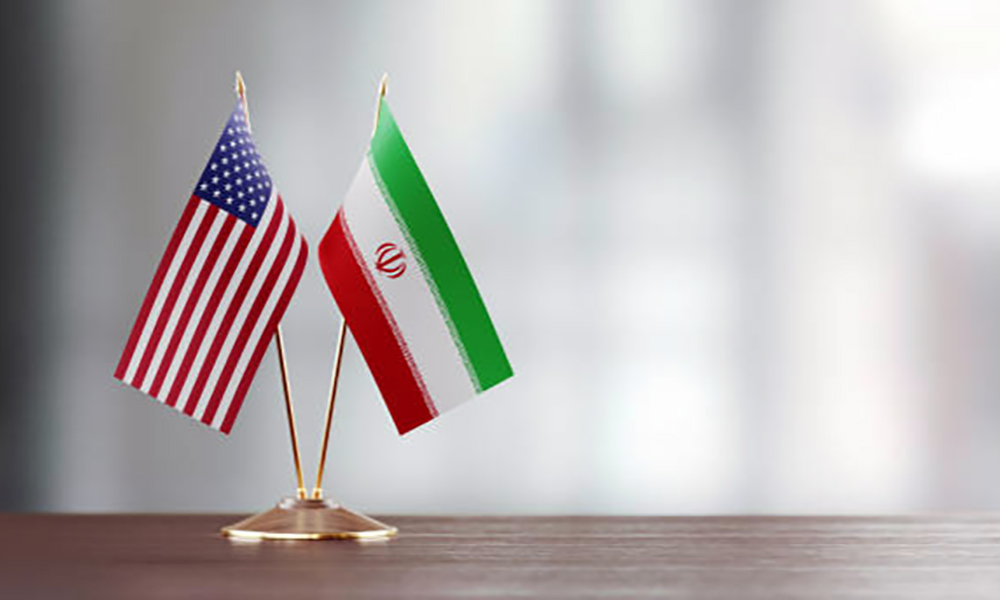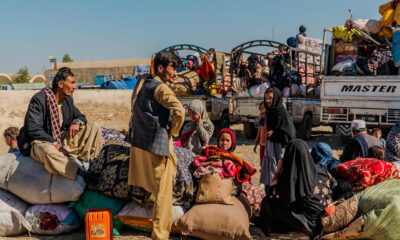Regional
US, Iran in talks to cool tensions with a mutual ‘understanding’

The United States is holding talks with Iran to sketch out steps that could limit the Iranian nuclear programme, release some detained U.S. citizens and unfreeze some Iranian assets abroad, Iranian and Western officials said.
These steps would be cast as an “understanding” rather than an agreement requiring review by the U.S. Congress, where many oppose giving Iran benefits because of its military aid to Russia, its domestic repression and its support for proxies that have attacked U.S. interests in the region, Reuters reported.
Having failed to revive a 2015 Iran nuclear deal, Washington hopes to restore some limits on Iran to keep it from getting a nuclear weapon that could threaten Israel and trigger a regional arms race. Tehran says it has no ambition to develop a nuclear weapon.
The 2015 deal, which then-President Donald Trump abandoned in 2018, had capped Tehran’s uranium enrichment at 3.67% purity and its stockpile of this material at 202.8 kg (447 pounds) – limits Tehran has since far exceeded.
U.S. and European officials have been searching for ways to curb Tehran’s nuclear efforts since the breakdown of indirect U.S.-Iranian talks. The willingness to restart discussions illustrates the rising sense of urgency in Western capitals about Iran’s programme, read the report.
The U.S. government has dismissed reports it is seeking an interim deal, using carefully constructed denials that leave open the possibility of a less formal “understanding” that could avoid congressional review.
State Department spokesman Matt Miller denied there was any deal with Iran.
However, he said Washington wanted Tehran to de-escalate tensions and curb its nuclear programme, cease support for regional proxy groups that carry out attacks, halt support for Russia’s war on Ukraine and release detained U.S. citizens.
“We continue to use diplomatic engagements to pursue all of these goals,” he added, without giving details.
An Iranian official said: “Call it whatever you want, whether a temporary deal, an interim deal, or a mutual understanding – both sides want to prevent further escalation.”
In the first instance, “that will involve prisoner exchange and unblocking part of Iran’s frozen assets”, he said.
Further steps might include U.S. sanctions waivers for Iran to export oil in return for ceasing 60% uranium enrichment and greater Iranian cooperation with the U.N. nuclear watchdog, he said.
“I’d call it a cooling-down understanding,” said a Western official on condition of anonymity, saying there had been more than one round of indirect talks in Oman between U.S. National Security Council official Brett McGurk and Iran’s chief nuclear negotiator, Ali Bagheri Kani.
U.S. Special Envoy for Iran Rob Malley has also met Iran’s ambassador to the U.N. after months of Iran refusing direct contact, Reuters reported.
The Western official said the idea was to create a status quo acceptable for all, getting Iran to avoid the Western redline of enriching to 90% purity, commonly viewed as weapons grade, and possibly even to “pause” its enrichment at 60%.
In addition to the 60% pause, both sides are discussing more Iranian cooperation with the International Atomic Energy Agency and not installing more advanced centrifuges in return for the “substantial transfer” of Iranian funds held abroad, the official said.
The official did not specify whether the pause meant Iran would commit not to enrich above 60% or whether it would stop enriching to 60% itself.
The order of the steps and how they might relate to a release of three detained U.S. citizens held by Iran was also unclear. Officials have previously said freeing them might be connected to the release of frozen funds.
Iran’s foreign ministry spokesperson said on Monday the two nations could exchange prisoners soon if Washington showed goodwill, saying there were talks through intermediaries, without giving details. Iran’s mission to the U.N. did not immediately respond to a detailed request for comment.
The Western official said the key U.S. objective was to keep the nuclear situation from worsening and to avoid a potential clash between Israel and Iran.
“If (the) Iranians miscalculate, the potential for a strong Israeli response is something that we want to avoid,” he said.
U.S. officials appear to avoid saying they are seeking an “agreement” because of a 2015 law under which Congress must get the text of any accord about Iran’s nuclear programme, opening a window for legislators to review and potentially vote on it.
U.S. House Foreign Affairs Committee Chairman Michael McCaul, a Republican, wrote to President Joe Biden on Thursday saying “any arrangement or understanding with Iran, even informal, requires submission to Congress”.
Regional
Iraq criminalises same-sex relationships with maximum 15 years in prison

Iraq’s parliament passed a law criminalising same-sex relationships with a maximum 15-year prison sentence on Saturday, in a move it said aimed to uphold religious values but was condemned by rights advocates as the latest attack on the LGBT community in Iraq.
The law aims to “protect Iraqi society from moral depravity and the calls for homosexuality that have overtaken the world,” Reuters reported citing a copy of the law.
It was backed mainly by conservative Shi’ite Muslim parties who form the largest coalition in mainly Muslim Iraq’s parliament.
The Law on Combating Prostitution and Homosexuality bans same-sex relations with at least 10 years and a maximum of 15 years in prison, and mandates at least seven years in prison for anybody who promotes homosexuality or prostitution.
It also imposes between one and three years in prison for anyone who changes their “biological gender” or wilfully dresses in an effeminate manner.
The bill had initially included the death penalty for same-sex acts but was amended before being passed after strong opposition from the United States and European nations.
Until Saturday, Iraq didn’t explicitly criminalise gay sex, though loosely defined morality clauses in its penal code had been used to target LGBT people, and members of the community have also been killed by armed groups and individuals.
“The Iraqi parliament’s passage of the anti-LGBT law rubber-stamps Iraq’s appalling record of rights violations against LGBT people and is a serious blow to fundamental human rights,” Rasha Younes, deputy director of the LGBT rights programme at Human Rights Watch, told Reuters.
Iraqi officials who oversee human rights could not immediately be reached for comment.
Major Iraqi parties have in the past year stepped up criticism of LGBT rights, with rainbow flags frequently being burned in protests by both ruling and opposition conservative Shi’ite Muslim factions last year.
More than 60 countries criminalise gay sex, while same-sex sexual acts are legal in more than 130 countries, according to Our World in Data.
Regional
China to host Hamas, Fatah for Palestinian unity talks

China will host Palestinian unity talks between Hamas and its rivals Fatah, the two groups and a Beijing-based diplomat said on Friday, a notable Chinese foray into Palestinian diplomacy amid the war in the Gaza Strip.
Hamas, which controls Gaza, is the group whose fighters stormed into Israeli towns on Oct. 7, killing 1,200 people and capturing 253 hostages. Israel has sworn to annihilate Hamas in an onslaught that has killed more than 34,000 Palestinians.
Fatah is the movement of Mahmoud Abbas, president of the Western-backed Palestinian Authority, which exercises limited self-rule in the Israeli occupied West Bank.
The two rival Palestinian factions have failed to heal their political disputes since Hamas fighters expelled Fatah from Gaza in a short war in 2007. Washington is wary of moves to reconcile the two groups, as it supports the PA but has banned Hamas as terrorists.
A Fatah official told Reuters a delegation, led by the group’s senior official Azzam Al-Ahmed, had left for China. A Hamas official said the faction’s team for the talks, led by senior Hamas official Moussa Abu Marzouk, would be flying there later on Friday.
“We support strengthening the authority of the Palestinian National Authority, and support all Palestinian factions in achieving reconciliation and increasing solidarity through dialogue and consultation,” said Chinese Foreign Ministry spokesperson Wang Wenbin at a regular briefing on Friday, without confirming the meeting.
The visit will be the first time a Hamas delegation is publicly known to have gone to China since the start of the war in Gaza. A Chinese diplomat, Wang Kejian, met Hamas chief Ismail Haniyeh in Qatar last month, according to the Chinese foreign ministry.
The Beijing-based diplomat, who had been briefed on the matter, said the talks aimed to support efforts to reconcile the two Palestinian rival groups.
China has lately demonstrated growing diplomatic influence in the Middle East, where it enjoys strong ties with Arab nations and Iran. Last year, Beijing brokered a breakthrough peace deal between longstanding regional foes Saudi Arabia and Iran.
U.S. Secretary of State Antony Blinken said he discussed with Chinese President Xi Jinping and other officials in Beijing on Friday how China can play a constructive role in global crises, including the Middle East.
Chinese officials have ramped up advocacy for the Palestinians in international forums in recent months, calling for a larger-scale Israeli-Palestinian peace conference and a specific timetable to implement a two-state solution.
In February, Beijing urged the International Court of Justice (ICJ) to give its opinion on the Israeli occupation of the Palestinian Territories, which it said was illegal.
More recently, China has been pushing for Palestine to join the United Nations, which Beijing’s top diplomat Wang Yi said last week would “rectify a prolonged historical injustice”.
(Reuters)
Regional
New UK sanctions target Iranian drone industry

Britain on Thursday announced new sanctions targeting Iran’s military drone industry, in response to Iran’s drone and missile attack on Israel earlier this month.
The measures, taken in co-ordination with the U.S. and Canada, target four businesses and two directors at a network of drone companies with the aim of limiting Iran’s ability to launch drones.
“The Iranian regime’s dangerous attack on Israel risked thousands of civilian casualties and wider escalation in the region,” British Foreign Secretary David Cameron said in a statement.
“Today the UK and our partners have sent a clear message – we will hold those responsible for Iran’s destabilising behaviour to account.”
Britain also said it would introduce new bans on the export of drone and missile components to Iran, seeking to limit its military capabilities.
Last week, Britain imposed sanctions on Iranian military figures and organisations, in another coordinated move with the United States, following Iran’s action against Israel.
Iran launched drones and fired missiles at Israel on April 13 as a retaliatory strike for the attack on its embassy compound in Damascus two weeks prior, raising the risk of further escalation in conflict in the Middle East.
(Reuters)
-

 World4 days ago
World4 days agoNorth Korea officials visit Iran in a rare public trip
-

 Sport4 days ago
Sport4 days ago‘Serious talent’ Fraser-McGurk bonds with Warner to light up IPL
-

 Latest News4 days ago
Latest News4 days agoOver 1,000 Afghan refugees forced out of Pakistan in one day
-

 Regional2 days ago
Regional2 days agoNew UK sanctions target Iranian drone industry
-

 Sport2 days ago
Sport2 days agoAfghanistan beat Iraq 5-3, inch closer to Futsal World Cup berth
-

 Regional3 days ago
Regional3 days agoTurkey accuses U.S. of double standards over Gaza in rights report
-

 Latest News2 days ago
Latest News2 days agoEU allocates 17 million euros to support Afghans on the move
-

 Latest News1 day ago
Latest News1 day agoPakistan extends registered Afghan refugees’ stay till June 30
























